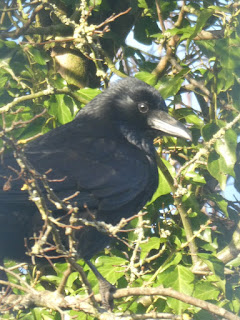‘Storm Hannah’ blasted the British Isles on Friday night and
through into Saturday. The weather forecaster said it was ‘unseasonably late’.
To my ears that puts it in the category of unusual and severe weather events now
battering the planet in many different places. Rain lashed my window deep in
the night and, as I listened safe in my warm bed, my mind turned to what this
storm might mean for the animals facing it outside. It is peak nesting season.
Now I have to admit that I like crows. A pair regularly come
into the garden and part of the privilege of often working at home is that over
the last few years I have got to know them quite well. They are larger than any
of the other regular bird visitors. They are also very wary; sensible for a
species that is so widely vilified, but they also know that little gifts of
food are regularly available on the lawn here (a prize for which they compete
with a pair of magpies). One interesting behaviour they regularly exhibit is
that if they judge that the food is too dry, they soak it in the small stone
bird bath for a minute or two before swallowing it or flying away with it.
On Saturday – very unusually - no crows and no magpies
visited the garden. I wondered if the storm had killed them. The lawn and the
streets beyond were strewn with twigs, leaves, blossom and buds that had been
ripped off trees by the power of the storm. I imagined the crows trying to hold
their nests together high in a widely rocking tree in the black of night. I
imagined them trying to keep their fledglings safe from the punishing blasts of
wind, rain and hail.
Then today (Sunday) one returned. Typically, the crows call
one to another in their famously harsh voices – in part I think to advise that
there is food available and no threat - but today he (or she) was silent. He
(or she) was also limping. Not badly (no toes missing, no bones broken) but
still clearly showing what I hope is only a strain. He picked up some food. He carefully
soaked it. Then he drank long and deep from the bird bath before he flew away.
Later today, I found myself some miles away by chance looking
up at a tree holding a colony of crows. I listened to their calling. Was it a
little more frantic than usual? They certainly sounded busy. I could see nests,
or at least remains of nests, partly hidden up behind the new leaves. Then I
went to look under the tree. The ground was strewn with bodies. Near-fledgling crow
youngsters, their flight-feathers not fully-formed and their freshly-dead
bodies starting to draw flies. They were perhaps just a few days off leaving
the nest. All the hard-work of their parents shattered in one atypical fearsome
night when what should have been the relative safety of a nest high above the ground
was totally destroyed.
So, in response to those who are again calling in the UK for a cull of crows (and other similar carnivorous birds), take note – there has
just been a cull! I don’t doubt that the crows will ‘re-group’, those that have
lost chicks, but not their mates, will probably try for a second brood. We can’t
know how successful this may be.
Some will suggest that these losses – which I suspect were
widespread (and did the starlings, rooks and others nesting high in trees fare
any better?) – are nature in action. I don’t think so and as atypical weather
events hit our wildlife over and over again, we can expect populations to
suffer. Indeed, I think the key debate now should not be about culling but quite
the opposite: trying to make wild populations more robust in the face of unprecedented
changes.
Meanwhile, one magpie has also returned to the little patch
of lawn that is my window on its world and hopefully both his partner and the crow’s
will return in coming days.



No comments:
Post a Comment